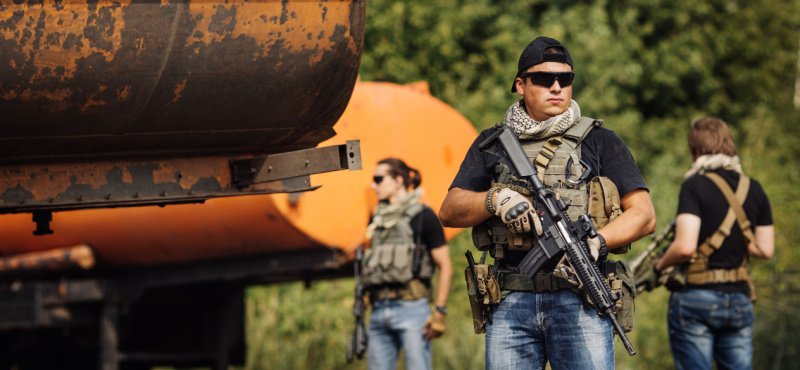Private military contractors have recovered from COVID-19 business setbacks. By 2028, the global market should exceed $3 trillion, according to the latest estimate. Such profitability, along with continued instability in so many parts of the world, means lots of job opportunities for private military contractors in the areas listed below.
The Afghanistan and Iraq Wars are over. But fighting continues in both nations. American people and property are at risk from terrorist attacks, usually foreign-sponsored terrorist attacks. Furthermore, the Syrian Civil War seems endless, and the Israel-Hamas War might spread.
Job opportunities mean injury chances. When service members are injured in the line of duty, the VA disability system compensates them. When contractors are injured in the line of duty, Defense Base Act benefits replace lost wages and pay medical bills. Insurance company lawyers routinely challenge these claims. So, unless they have a Defense Base Act lawyer, victims normally wind up settling for less.
Combat Support
When most people think of private military contractors, they think of combat support. Indeed, contractors often escort supply convoys and patrol public areas. Such tip-of-the-spear activities are unbelievably hazardous. Militants and insurgents are completely unpredictable. There’s no telling when, where, or how they will strike next.
Serious combat injuries usually require immediate medical evacuation. Most field hospitals are essentially first aid stations. Their workers stabilize seriously injured victims for transportation to a larger medical facility that, in many cases, is located on another continent, probably western Europe.
The combination of a serious injury and delayed treatment usually takes a terrible toll. Even after doctors and physical therapists complete their work, these victims usually continue to deal with lingering injuries. They need and deserve compensation for these disabling injuries.
Non-Combat Support
Other combat support duties are not quite as glamorous. Indeed, to many servicemembers, guard duty is punishment duty. However, many contractors are former law enforcement officers. They know the value of security deterrence. Militants and terrorists think twice before they attack hard targets.
Additionally, guard duty is a time-honored private military contractor duty. The first military contractors in Revolutionary War duties were cooks, medics, and other support personnel who knew how to use a musket if things got hot.
Many contractors work outside their normal shifts on guard duty. American people and property are at risk 24/7/365. DBA benefits are still available in these cases. In fact, these benefits are available if the victim was hurt during off-work hours, as long as there’s a nexus (indirect relationship) between injury and deployment.
Intelligence Collection
Offensive military operations are off-limits to private military contractors, according to U.S. law. Intelligence gathering is one of the few proactive duties they can perform, and it is a duty they perform very well.
As mentioned, many private military contractors are former law enforcement officers. So, they know when to build relationships with people who could provide intelligence and when to lean on individuals who are reluctant to provide vital information.
Contractors never use weapons when they collect intelligence. The DBA applies whether or not an overseas private military contractor is “military” or not.
Weapons Maintenance
Many private military contractors never leave an American base. Instead, they maintain the weapons systems that give American forces and their allies a vital edge in the field.
Advanced weapons systems in harsh, semi-arid environments need lots of TLC. Helicopters, fighter planes, missiles, and other hardware weren’t designed to work in such environments. So, they break down frequently. A problem with a small and seemingly insignificant component could ground a helicopter.
Therefore, maintenance contractors usually wear two hats. They regularly inspect systems to anticipate and correct future problems. Additionally, if the hardware is damaged, perhaps during combat, contractors quickly address the problem.
The DoD prefers contractors in these situations. Many private military contractors worked for the firm that designed and/or built the hardware they maintain.
Training
This common military contractor responsibility might be the most proactive one of all. Effective training reduces the time American soldiers and private military contractors must spend in-country.
Contractors train government security forces formally and informally. In addition to normal military drills, they teach experienced troops how to fight insurgency campaigns. These efforts are not like anything they learned in military school.
Contractors discipline rebel troops. This training transforms men who have passion for a cause but no military experience into an effective fighting force.
Military training is necessary and dangerous. Training accidents, from falls to vehicle collisions to aircraft crashes, are common. These incidents usually cause lasting injuries. Broken bones and other such wounds normally never heal 100%.
Goodwill
American armed forces have a very bad reputation in most of the world, mostly due to events that occurred long ago. Private military contractors do not have the same baggage. So, contractors give America’s overseas image a political as well as a military boost.
Rebuilding
Rebuilding contractors establish goodwill for the next round of fighting if the U.S. chooses to participate. Locals know who rebuilt schools, hospitals, and other neighborhood infrastructure, and they know it was not the government. They do not forget who did what when fighting resumes.
Contractors must have a plan. They cannot simply move in and order construction crews to work. That’s just another form of imperialism. So, contractors work with local laborers whenever possible. This division of labor allows contractors to control the project and local residents to participate in it.
For more information about the DBA procedure, contact Barnett, Lerner, Karsen, Frankel & Castro, P.A.

